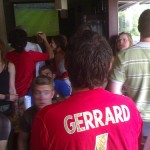Football, Broadcasting and the Internal Market: Is a common audio-visual space in sight? Panel Discussion at City Law School – Hugh Cumber

Just one week after the Grand Chamber of the ECJ gave its preliminary ruling in FA Premier League v QC Leisure and others and Murphy v Media Protection Services, legal experts offered their analysis of the ruling and its potential impact at a panel discussion hosted by City Law School.
Professor Sir Robin Jacob chaired the five-person panel, each of whom offered a differing perspective on the decision and its potential legal and commercial impact. Jeremy Phillips, an academic and IP consultant with Olswang, began, offering a broad commercial context for the decision. He stressed that this was a decision about money, drawing attention to the time scale on which a company acts compared to the time it takes the Luxembourg court to reach a decision. Professor Phillips went on to suggest some ways in which the FAPL licensing scheme could be altered to reflect the court’s decision. He also pointed out that this decision may ultimately prove to be less significant than it might seem now, as the FAPL will have to adopt new licensing models in the future to take into account the rising popularity of online distribution.
City University’s Lorna Woods went next, examining some of the European law surrounding broadcasting which forms the background of this appeal. Professor Woods went on to suggest that European directives relating to IP and broadcasting have not always been consistent or clear, drawing attention to the problems created by overlapping directives created for different purposes but with similar terminology. She also questioned the long line of case law on the special status of sports.
Dan Wilsher’s talk examined the free movement provisions in the treaty, exploring the distinction between goods and services, and going on to examine how digital services could be ‘commodified’, altering their legal status. Dr Wilsher also explored the subtext of the Luxembourg court’s decision, pointing out that though the court’s judgment does not explicitly analyse the competition aspects of the case, the Premier League’s monopolistic business practice is implicitly criticised in the judgment.

Queen Mary’s Jonathan Griffiths gave the final talk of the evening, examining evidence that in this jurisdiction we are in the midst of a “copyright revolution”, as we push towards fully harmonised copyright law at an accelerated rate. He examined the test of creativity applied to copyright in the context of sport events, questioning the logic of the decision that football is subject to rules, limiting creative choice. After all, a sonnet or sonata is also subject to strict rules, yet few would question their creative content. Mr Griffiths went on to explore some of the legislation and case law surrounding copyright and reproduction.
The evening closed with Professor Sir Robin Jacob suggesting some ways we could move forward from this decision, before opening the floor to questions. Questions ranged from the creativity (or otherwise) of practiced football manoeuvres to the influence of the IP law of other jurisdictions. After all, as Professor Jacob observed, the one area IP law should not apply is in nicking good ideas from other people’s law.
Want more? Read a live blog of the event.
Hugh Cumber is currently studying his GDL at The City Law School.
